United Nations Environment Programme’s United for Efficiency (UNEP-U4E)
Brief introduction
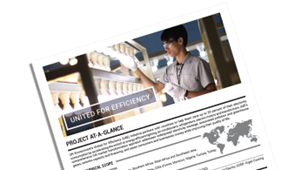
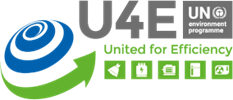
UNEP-U4E is a global effort supporting developing countries and emerging economies to move their markets to energy-efficient lighting, appliances and equipment. It was established in 2010 (under the en.lighten initiative) and originally focused on the transition to efficient lighting worldwide. As such, lighting remains a key component of the initiative and UNEP- U4E has developed a comprehensive range of guidance documents and tools for use by governments and other stakeholders in promoting the market transformation to energy-efficient lighting and encouraging their evolution to high-efficiency LED products.
UNEP-U4E partners with countries and regional associations to support them in the implementation of a proven integrated policy approach. Through this approach the needs and priorities of key stakeholders –consumers, businesses, civil society and officials– are addressed in each of five key areas:
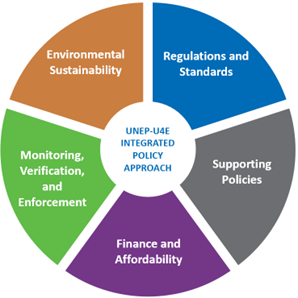
· Regulations and Standards (minimum energy performance standards) cover a collection of related requirements that define which products can be marketed and those that should be eliminated to ensure a successful efficient product market transition strategy in a particular country or region.
· Supporting Policies, such as labelling and consumer awareness campaigns, can assist the implementation of regulations and standards and accelerate market transformation. A combination of complementary policies and measures may be implemented, including market-based instruments that may contain elements of voluntary or mandatory action (e.g., labelling, smart-phone apps, QR codes), and information and communication campaigns that inform end-users in order to change or modify their behaviour.
· Finance and Affordability: High first-cost challenges with the most highly efficient products can be addressed by implementing economic/fiscal instruments and incentives that can reduce prices. Through such mechanisms, end-users can reap electricity bill savings over the lifetime of the products. Financing structures that can overcome the barrier or higher initial costs, such as energy service companies, revolving funds and electric utility on-bill financing are encouraged.
· Monitoring, Verification, and Enforcement: The success of any efficient product policy depends on a well-functioning system of monitoring, control, and testing to ensure enforcement and compliance with regulations and standards. Unless effective and timely market surveillance systems are in place, incentives for energy efficiency can have the risk that substandard products risk entering markets in increasing numbers. This can jeopardize energy and financial savings. Poor quality products also create disappointment for consumers who may avoid energy efficient technologies in the future. Substandard products also create an uneven playing field, penalizing producers who comply with the mandated requirements.
· Environmental Sustainability: Mercury, high global warming potential and ozone depleting refrigerants, electronic waste, and other hazardous substances should be managed in line with global best practice restrictions and recycling to minimize any environmental or health impact. If one doesn’t already exist, attention should be given to the development of a legal framework for environmentally sound, end-of-life activities, including waste recovery and design.
Outstanding Achievement Brief
Since its inception, UNEP-U4E has made an outstanding contribution to the global adoption of solid state lighting (SSL) through published guidance, tools and capacity building in partnership with national governments and regional bodies. Some of the key efforts and achievements which have contributed to this global SSL development and application are summarized below:
Model Regulation Guidelines for General Service Lamps and Linear Lamps
The UNEP-U4E model regulation guidelines for general service lamps and linear lamps are intended for use as a template by regulatory authorities in developing and emerging economies that are considering a voluntary, regulatory or legislative framework for use with incentive programmes, public procurements, minimum energy performance standards, energy labels and other such market transformation interventions to promote energy-efficient lamps; or those that have a legislative framework but have not yet developed, or are updating, regulations for energy-efficient lamps.
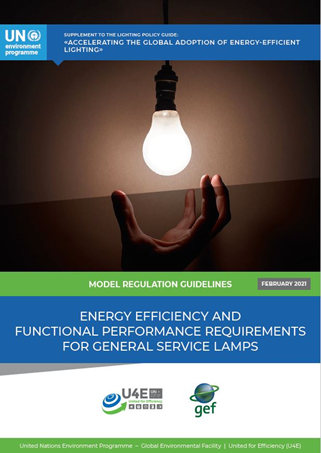
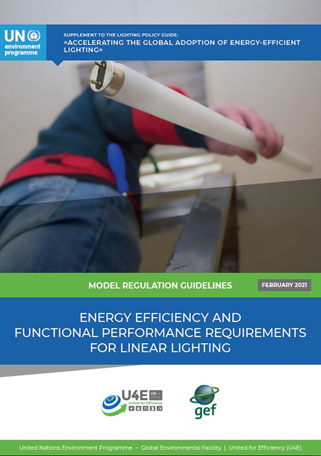
The guidelines describe the means to regulate a transition for general service lamps for general illumination applications, and that for linear lighting systems, to more energy-efficient lamps and LED solutions. They include all the key elements that are needed –definitions, scope, performance requirements, information requirements, applicable test methods and compliance criteria –and were developed in consultation with dozens of experts from the lighting sector and global regions to assess best practices and new developments.
Green Public Procurement Technical Guidelines and Specifications for Energy Efficient Lighting
Sustainable, or green, public procurement is the process whereby public sector organisations meet their needs for goods, services, works and utilities in a way that achieves value for money on a whole life basis in terms of generating benefits not only to the organisation, but also to society and the economy, whilst minimizing, and if possible, avoiding, damage to the environment.
The UNEP-U4E Green Public Procurement Technical Guidelines and Specifications for Energy-efficient Lighting include a step‑by‑step approach on how to apply sustainability and current best technical criteria for lighting products in accordance with best international regulatory, social and environmental practices, and introduce the rationale to be adopted by procurement practitioners when selecting among a set of products.
They recommend that sustainable public procurement energy requirements should target products that are the 20% most efficient in the market in order to incentivise industry and the market to accelerate the transition to more sustainable technologies.
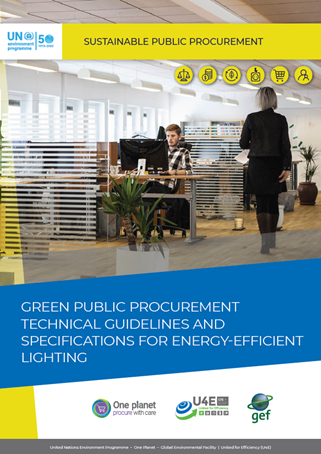
They are a key strategic instrument intended for public procurers, technical personnel and related officers in the expectation that these recommendations are integrated in their day-to-day procurement activities.
Product Registration System Prototype
A product registration system is a tool used to capture specific information on products to underpin policies or programmes, and to provide an initial compliance gateway for products entering the market. They have a number of benefits, such as an increased incentivization of more efficient products or a reduced workload and costs for applicants and regulators.
Lighting is one of the three core products built into the UNEP-U4E prototype product registration system. This free-to-use system is built for countries which do not have their own system and would like to implement a product registration system. It is based on global best practices and contains the essential elements of a registration system, including user input forms, data tables and output reports.
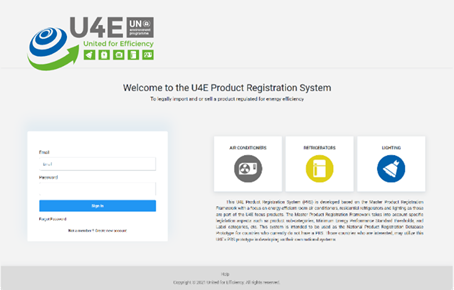
UNEP-U4E’s country savings assessments show the potential monetary savings, carbon mitigation and environmental benefits that are possible by transitioning to energy-efficient lighting, cooling appliances and equipment. For 156 developing and emerging economies, they provide details of the savings that can be achieved by implementing policies that primarily regulate the energy consumption of product groups which together consume more than 50% of electricity worldwide – lighting, residential refrigeration, commercial refrigeration, room air conditioners, electric motors and distribution transformers.
By providing information on the potential financial, environmental, energy, and societal benefits that are possible by transitioning the market to energy efficient and climate friendly products, the country savings assessments enable policymakers to make informed decisions on, and build robust business cases for, the implementation of energy-efficiency policies to meet their nationally determined contributions (NDCs) whilst providing them with an overview of potential carbon emissions that could be offset.
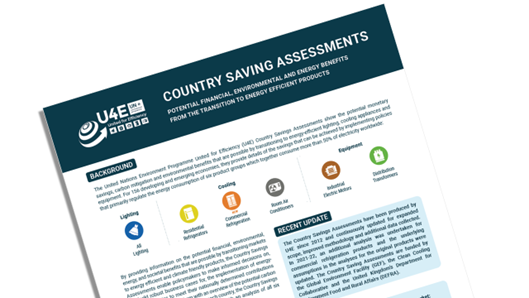
The assessments compare a business-as-usual scenario with a minimum ambition scenario, in which policies are introduced in line with the basic requirements of the UNEP-U4E model regulation guidelines, and a high ambition scenario in which more stringent policies are implemented in line with the highest levels proposed in the guidelines.
For each country, the country savings assessments provide a downloadable overview report with an analysis of all six products. Separate analyses for lighting (in the residential, commercial and outdoor sectors), cooling (residential refrigerators, commercial refrigeration and room air conditioners), and equipment (industrial electric motors and power distribution transformers) are also available to view on the website.
Regional and National Projects
In addition to its published guidance and tools, UNEP-U4E is active in regional and national projects to support on the ground activities to promote market transformations to energy-efficient lighting. In total we have, or have had, projects in 46 countries across Asia, Africa and Latin America on energy-efficient lighting, which are structured around the UNEP-U4E integrated policy approach.
By 2040, using the minimum ambition scenario as a conservative estimate, these national/regional projects are expected to achieve annual savings of 12 TWh (or 60% of the predicted savings for developing/emerging economies in this year), with associated CO2 savings of 13.6 million tonnes and a financial saving of USD 1.7 billion for consumers on their electricity bills. These savings are equivalent to avoiding the construction of more than five large (500 MW) powers stations.
ASEAN Regional and National Lighting Roadmaps
This UNEP-U4E and ASEAN Centre for Energy (ACE) project is working with the ten ASEAN member countries to advance policies, strategies and actions for the phase-out of inefficient lighting. Emphasis is on an integrated policy approach so that a transition can be sustained by the regional market without continued external support or resources.
As a result of the project, theRegional Policy Roadmap For Harmonization Of Energy Performance Standards For Lighting was endorsed in September 2019.
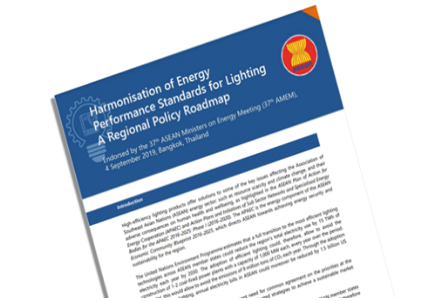
This provides clear guidelines for the adoption of policies to promote the use of efficient lighting products and specifies that ASEAN countries will progress towards agreed target reference MEPS of 80 lumen/watt by 2023. It also provides guidance on harmonisation of test methods, testing infrastructure and mutual recognition agreements. It further specifies that, by 2022, the ASEAN Center for Energy would establish a regional product database for the collection of product information, which has been developed with support from UNEP-U4E, along with a prototype national product registration system which can be customised by countries to implement their own national system.
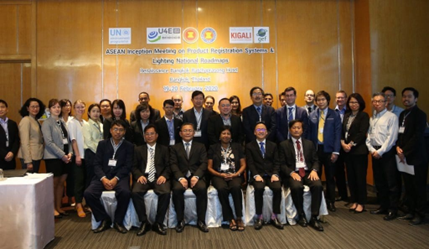
In addition, U4E and ACE supported the development of National Roadmaps for each of the ASEAN Member States. The National Roadmaps are aligned with the Regional Lighting Roadmap, yet provide specific activities for the country with timeframes for implementation.
Advancing Indonesia’s Lighting Market to High Efficient Technologies
Indonesia received additional support in the implementation of their transition to energy efficient lighting through the UNEP-U4E ADLIGHT, Advancing Indonesia’s Lighting Market to High Efficient Technologies, project.
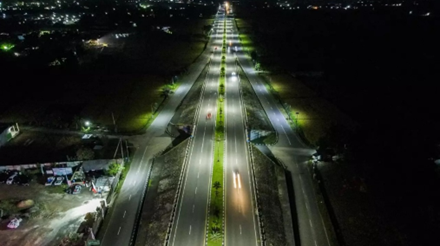
This three-year (2020-2023) project is being executed by the Ministry of Energy and Mineral Resources, Directorate General for New, Renewable Energy and Energy Conservation (MEMR/DGNREEC), in cooperation with the United Nations Development Programme (UNDP), and with the financial support of the Global Environment Facility. It aims to reduce electricity demand and related greenhouse gas emissions by promoting increased use of high efficiency lighting technologies through the transformation of the national market. UNEP-U4E has provided capacity building support to the project stakeholders throughout the project and the consequent increase in breadth of knowledge and skills has underpinned the development of MEPS and energy labels for LED lights (which were formalised with the approval of the Ministerial Decree in July 2022 and are scheduled to come into force in July 2023) and helped inform improved monitoring, verification and enforcement activities.
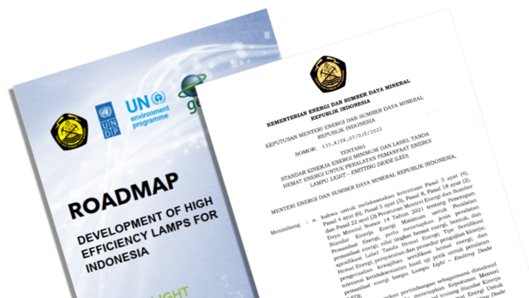
The UNEP-U4E Delivering the Transition to Energy Efficient Lighting in Residential, Commercial, Industrial, and Outdoor Sectors project in Pakistan was implemented in conjunction with Pakistan’s National Energy Efficiency and Conservation Authority (NEECA), working with multiple other local institutions, including the Pakistan Standards and Quality Control Authority (PSQCA) and the Pakistan Council for Scientific and Industrial Research (PCSIR) in its role of accredited organization in charge of electronic testing facilities, as well as local manufactures and their associations, universities and academic institutions and UNEP-U4E technology partners.
Its objective was to secure significant global climate change mitigation and environmental benefits by instituting efficient lighting policies and creating a framework for innovative financial mechanisms that promote innovative and high efficiency products.
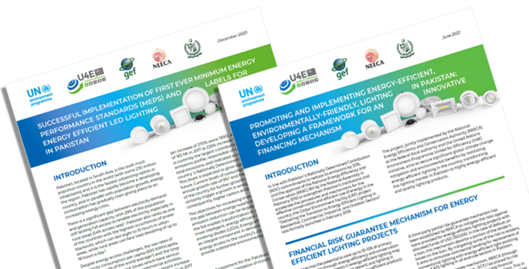
In December 2020, a key milestone in the project was reached when new mandatory MEPS for energy efficient LED lighting come into force, supported by a 5-star energy labelling scheme.
The steps towards achieving this included the development of a national efficient lighting policy and strategy which contains the regulatory framework for MEPS and labelling, which was undertaken using a collaborative approach through in-person and virtual consultation workshops in Karachi and Islamabad during 2019 and 2020. Underpinning these discussions were the results of a lighting market assessment carried out by NEECA as part of the project which gathered data through a detailed local market survey, and the UNEP-U4E model regulation guidelines for general service lamps.
Throughout the project, the Government of Pakistan was committed to spreading the message on the benefits of LED lighting and energy efficient labels, using communication campaigns to encourage broad public acceptance and help modify user behaviour. A wide range of communication and outreach activities have taken place, including lectures by UNEP-U4E technical experts and NEECA energy officers at academic institutions, radio and television broadcasts, and digital campaigns on social media with videos and informative brochures.
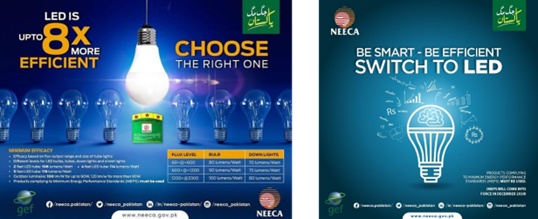
Financial institutions in Pakistan strongly prefer lending against the balance sheet (asset-based lending) and are less willing to provide cash flow lending (project-based lending) for energy efficiency projects.
To address this barrier under the project NEECA collaborated with eligible local financial institutions to establish a third-party partial risk guarantee mechanism to mitigate the risks against loans provided for energy-efficient lighting projects with allocated funds of USD 350,000. In the case of default on a loan, this mechanism absorbs a portion of the lender’s losses on the loan. By mitigating some of the risk to lenders, stimulates commercial lending for replacement of conventional lighting with energy-efficient LED lighting in all end-use sectors in Pakistan.
Delivering the Transition to Energy Efficient Lighting in Chile
UNEP-U4E supported the UNEP-GEF project, Delivering the Transition to Energy Efficient Lighting in Chile, together with the Ministry of Energy and Fundacion Chile. The project ran from 2016 to 2019 and entailed development of MEPS and support for lighting testing and consumer communication efforts.
The communication campaign was framed under the name “Cambia El Foco” or “Change the Focus”, which initially ran in public schools but was later supported by municipalities, retailers, the electric utility (ENEL), lighting suppliers, the Chilean press and social media. It included development of a website with LED discount vouchers, energy efficiency tips and savings calculators as part of a consumer awareness raising campaign encouraging a nationwide switch to climate-friendly and energy-efficient LED lighting. A summary of the campaign can be found in this video.

The project also developed MEPS and labelling systems for energy efficient LEDs and lighting systems. The project’s resources were used to expose local stakeholders to the best international practices for developing MEPS for lighting devices and unified labels that would increase the availability of high-quality energy efficient lighting devices in Chilean market. With the assistance of the professional network of the UNEP-U4E, the Ministry of Energy was able to accelerate its development of a lighting MEPS and a unified labelling system into a National Energy Efficiency Law which was implemented in mid-2020.